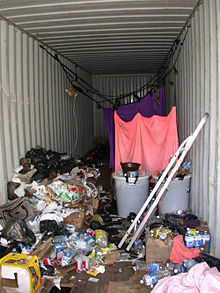Port Sandbox. It is estimated that over 7000 species are transported from port to port in ship bilge water. [1]
There is a large amount of cargo that is lost each year. In the year 2001 and before the loss of cargo amounted to 12 billion United States dollars annually and it increased 20 percent from before that year.[2]
During times of crisis like the pandemic of COVID-19, ports see an impact on the revenue they may provide to their respective country. It is important to compare the Pandemic impact on our ports VS the economic crisis of 2008-2009. This may give us a clear picture of how important Ports are to our economy.[3]
https://wildlife.ca.gov/OSPR/Science/Marine-Invasive-Species-Program/Definition
- ^ "What are California Marine Invasive Species?". wildlife.ca.gov. Retrieved 2021-03-17.
- ^ "- CRIME AND SECURITY ISSUES INVOLVING U.S. SEAPORTS". www.govinfo.gov. Retrieved 2021-03-19.
- ^ "Disruptions and resilience in global container shipping and ports: the COVID-19 pandemic versus the 2008–2009 financial crisis". link.springer.com. doi:10.1057/s41278-020-00180-5. PMC 7781181. Retrieved 2021-03-19.
{{cite web}}: CS1 maint: PMC format (link)
 | This is a user sandbox of Sideninfc. You can use it for testing or practicing edits. This is not the sandbox where you should draft your assigned article for a dashboard.wikiedu.org course. To find the right sandbox for your assignment, visit your Dashboard course page and follow the Sandbox Draft link for your assigned article in the My Articles section. |
Crime on Ports (WHAT I ADDED TO MY GROUPS WIKIPEDIA ARTICLE)




Piracy has been an economic liability to nations since the 17th century, In many parts, it actually began as a legitimate occupation. Nations like England[1] and many others would essentially have what was known as "Privateers[2]", at the time. These were commissioned ships by the government, whom were paid to prey on merchant ships of other countries. This was a way to make a steady liability for enemies of the nation[3], by allowing piracy[4] to happen to ships of other nations within their waters. Piracy was a gateway to cause havoc within the economic system of nations in chaos. Since the beginning of piracy, things have changed, piracy is no longer practiced the way it started by nations around the world, at least not in full effect. Piracy is still practiced in certain regions of the world as a means to make a living. This creates havoc within the economic system because pirates hijack [5] merchant ships like Oil Tankers[6] and Cargo Tankers. Which in turn makes it a liability for companies around the globe because it is now product that might be lost forever. The United States Maritime Administration (MARAD)[7] has placed certain plans of action to minimize piracy around the globe since the piracy problem in the Horn of Africa began to escalate in the summer of 2008[8]. They have partnered with the US Navy and the US Coast Guard to try and stabilize the rise of piracy near the coasts of Africa and in the rest of the globe. Information of this can be found in the document called Global Counter Piracy Guidance For Companies, Masters, and Seafarers[9]. This is document has updated details on piracy around the world, locations that one might want to avoid. It also has information on prevention and action if one was to encounter pirates.
- ^ "England", Wikipedia, 2021-05-11, retrieved 2021-05-15
- ^ "Privateer", Wikipedia, 2021-04-21, retrieved 2021-05-15
- ^ "Nation", Wikipedia, 2021-05-14, retrieved 2021-05-15
- ^ "Piracy", Wikipedia, 2021-04-14, retrieved 2021-05-15
- ^ "Hijacking", Wikipedia, 2021-05-02, retrieved 2021-05-16
- ^ "Oil tanker", Wikipedia, 2021-05-13, retrieved 2021-05-16
- ^ "United States Maritime Administration", Wikipedia, 2021-04-16, retrieved 2021-05-16
- ^ "Office of Maritime Security | MARAD". www.maritime.dot.gov. Retrieved 2021-05-16.
- ^ www.maritimeglobalsecurity.org https://www.maritimeglobalsecurity.org/risksissues/piracy/. Retrieved 2021-05-16.
{{cite web}}: Missing or empty|title=(help)